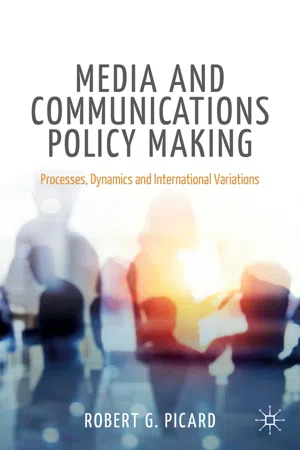
Media and Communications Policy Making
Processes, Dynamics and International Variations
- English
- ePUB (mobile friendly)
- Available on iOS & Android
Media and Communications Policy Making
Processes, Dynamics and International Variations
About this book
This textbook focuses on how media and communications policy is made and what influences its design. It explores the structures and processes in which policymaking takes place worldwide, the factors that determine its forms, influence its elements, and affect its outcomes. It explores how to analyze policy proposals, evaluate policy, and use policy studies approaches to examine policy and policymaking. Truly international in scope, it lays out the variety of political, social, economic, and institutional influences on policy, the roles of industries and policy advocates in the processes, and issues and factors that complicate effective policymaking and skew policy outcomes. This textbook is a valuable resource for advanced undergraduate and postgraduate students.
Frequently asked questions
- Essential is ideal for learners and professionals who enjoy exploring a wide range of subjects. Access the Essential Library with 800,000+ trusted titles and best-sellers across business, personal growth, and the humanities. Includes unlimited reading time and Standard Read Aloud voice.
- Complete: Perfect for advanced learners and researchers needing full, unrestricted access. Unlock 1.4M+ books across hundreds of subjects, including academic and specialized titles. The Complete Plan also includes advanced features like Premium Read Aloud and Research Assistant.
Please note we cannot support devices running on iOS 13 and Android 7 or earlier. Learn more about using the app.
Information
Part IContexts and Means of Policy Making
1. Introduction to Media and Communications Policy Studies
Table of contents
- Cover
- Front Matter
- Part I. Contexts and Means of Policy Making
- Part II. Three Levels of Policy Making
- Part III. Policy Reviews, Advocacy and Future Research
- Back Matter